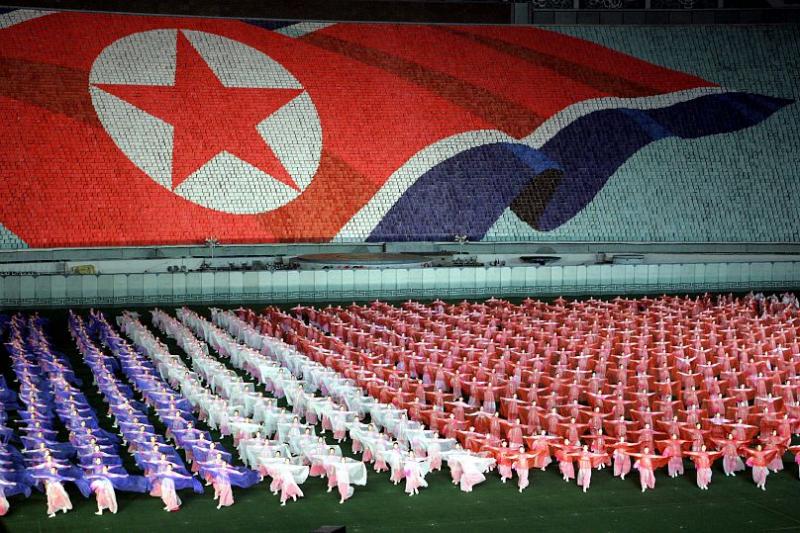North Korea enforces an anti-shorts law - but it's only affecting women
In news that would be shocking if it didn’t come out of one of the most authoritarian nations, North Korea has banned the wearing of shorts.
ADVERTISEMENTTo make it even worse, especially with temperatures upwards of 30° Celsius, it’s only women who have been slapped with the regulation.
The country’s ‘Supreme Leader’ Kim Jong-Un has decreed the wearing of shorts by women amounts to “capitalist fashion”.
But how do we know about the latest bizarre rule out of North Korea, a nation which is practically on permanent lockdown?
Inhabitants of North Korea must abide by the country's draconian rules and blend in at all timesNG HAN GUAN/APRadio Free Asia, a broadcasting service which aims to get the bottom of propaganda put out by totalitarian countries, interviewed an anonymous resident.
Although the regime in North Korea demands total loyalty to Jong-Un, one ‘subject’ told the radio station that 10 women had been arrested in the country, simply for wearing above-the-knee trousers.
“They had to write a statement of self-criticism and sign a document saying they would face legal consequences if they were caught wearing shorts again,” the anonymous source explained, adding, “Many women are complaining, asking why men can wear shorts and women can't. They are saying that the authorities are discriminating against us”.
The shorts ban is a new part of a law passed in 2020, with the intention of putting the kibosh on so-called ‘anti-socialist behaviour’.
Constant surveillance: Police women stand on a street in PyongyangDavid Guttenfelder/APIt’s not the first rule to have raised eyebrows in North Korea, especially with regards to the sexist imbalance.
Earlier in August, Radio Free Asia reported that a ban on smoking in public was restricted only to women. Kim Jong-Un himself is famously a smoker, but that fact didn’t stop him imposing fines on female residents.
At the time, a north Pyongan resident revealed that two women had been fined for smoking outside while they ate and were warned that if they were caught again, they could be imprisoned at a disciplinary labour centre for a month.
The shorts outlawing is also not the first clothing-based ban seen in recent times in North Korea.
ADVERTISEMENTJust last year, women were condemned for wearing ‘capitalist fashions’ - namely tight trousers and having dyed hair.
In a video, these women were dubbed 'capitalist delinquents' and accused of wearing 'indecent clothes', not permitted under the ‘ideal’, identikit, ‘North Korean style’.
Regulations and bans outside North Korea
North Korea is not the only Asian country which has astounded global onlookers with its oppressive clothing rules.
In Japan, authority figures have long imposed strict regulations on what school students can wear - down to the colour of their underwear, the length of their socks and even hairstyles.
Too much neck on show? Japan's ponytail ban would have us think soBarbara Alper/Getty ImagesGirls are banned from wearing their hair in ponytails as it’s thought, bizarrely, that exposing the nape of their necks could ‘sexually excite’ male students.
ADVERTISEMENTIt’s a draconian rule which has been around for decades. Featuring on a list known as buraku kosoku, it sits besides mandates on skirt length, eyebrow shape and even hair colour.
Some schools are so tough on the latter that they demand photographic proof from students of their natural hair colour and texture, if it isn’t strictly black and straight.
Pupils are seldom given an explanation for such bizarre rules, many of which appear to be entirely arbitrary. Some schools which ban ponytails allow bob haircuts which expose an equal amount of the neck, if not more.
Japan enforces rules on schoolchildren including bans on hairstyles, certain underwear colours and skirts deemed 'too short'KAZUHIRO NOGI/AFP via Getty ImagesBuraku kosoku dates back to the 1870s.
Initially brought in as systematic regulation of education, the rules became more restrictive in the 1970s and ‘80s, apparently to combat violence and bullying in schools.
ADVERTISEMENTSome commentators suggest the directives have been put in place to ensure no one stands out.
Identikit clothing rules mean no one stands out in Japanese schoolsSOPA Images/GettyWhile many of their complaints fall on deaf ears, one intrusive rule has thankfully been dropped.
Following complaints, schools have dropped the ban on underwear any colour other than white. Pupils can now wear grey, black, or navy blue undergarments - but it remains unclear how this rule is exacted.
منبع خبر: یورو نیوز ![]()
اخبار مرتبط: North Korea enforces an anti-shorts law - but it's only affecting women
حق کپی © ۲۰۰۱-۲۰۲۴ - Sarkhat.com - درباره سرخط - آرشیو اخبار - جدول لیگ برتر ایران

